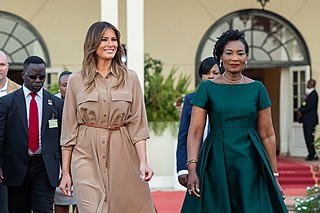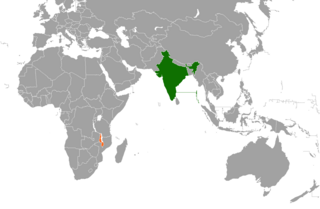
Malawi, officially the Republic of Malawi, is a landlocked country in Southeastern Africa that was formerly known as Nyasaland. It is bordered by Zambia to the west, Tanzania to the north and northeast, and Mozambique to the east, south and southwest. Malawi spans over 118,484 km2 (45,747 sq mi) and has an estimated population of 19,431,566. Malawi's capital is Lilongwe. Its second-largest is Blantyre, its third-largest is Mzuzu and its fourth-largest is its former capital, Zomba. The name Malawi comes from the Maravi, an old name for the Chewa people who inhabit the area. The country is nicknamed "The Warm Heart of Africa" because of the friendliness of its people.

This article is about the demographic features of the population of Malawi, including population density, ethnicity, education level, health of the populace, economic status, religious affiliations and other aspects of the population.

The economy of Malawi is predominantly agricultural, with about 80% of the population living in rural areas. The landlocked country in south central Africa ranks among the world's least developed countries. In 2017, agriculture accounted for about one-third of GDP and about 80% of export revenue. The economy depends on substantial inflows of economic assistance from the IMF, the World Bank, and individual donor nations. The government faces strong challenges: to spur exports, to improve educational and health facilities, to face up to environmental problems of deforestation and erosion, and to deal with the problem of HIV/AIDS in Africa.

Bingu wa Mutharika was a Malawian politician and economist who was President of Malawi from May 2004 until his death in April 2012. He was also President of the Democratic Progressive Party, which he founded in February 2005; it obtained a majority in Malawi's parliament in the 2009 general election. During his two terms in office, he was noted for being the Chairperson of the African Union in 2010–2011, as well as for several domestic controversies. In 2009, he purchased a private presidential jet for $13.26 million. This was followed almost immediately by a nationwide fuel shortage which was officially blamed on logistical problems, but was more likely due to the hard currency shortage caused by the freezing of aid by the international community. He died in office from a cardiac arrest on 5 April 2012, at age 78.
Air Malawi Limited was the state-owned national airline of Malawi, based in Blantyre, which operated regional passenger services. Because of its financial situation, the airline was placed in voluntary liquidation, the Malawi Government announced in November 2012, and flights have been suspended since February 2013.
Nyika National Park lies in the northeast of Zambia, on the western edge of the Nyika Plateau, which is one of the highest parts of the country and most of which lies in neighbouring Malawi.

The transition from a one-party state to a multi-party democracy significantly strengthened the already cordial U.S. relationship with Malawi. Significant numbers of Malawians study in the United States. The United States has an active Peace Corps program, Centers for Disease Control and Prevention, Department of Health and Human Servicess, and an Agency for International Development (USAID) mission in Malawi. Both countries have a common history and English language, as they were part of the British Empire.

Malawian cannabis, particularly the strain known as Malawi Gold, is internationally renowned as one of the finest sativa strains from Africa. According to a World Bank report it is among "the best and finest" marijuana strains in the world, generally regarded as one of the most potent psychoactive pure African sativas. The popularity of this variety has led to such a profound increase in marijuana tourism and economic profit in Malawi that Malawi Gold is listed as one of the three "Big C's" in Malawian exports: chambo, chombe (tea), and chamba (cannabis).

The history of human rights in Malawi during recent decades is complicated, and the situation at present is in a state of dramatic, and positive, transition.

Malawi Washington Association (MWA) was established in 1994 and is the first association in the United States that was organized to promote and retain Malawi and Malawian culture amongst Malawi's diaspora in the United States and Canada. It was founded by Peter Kapakasa, Stafford Chipungu, Jonathan Kamkwalala, and the late Henri Nsanjama. It is a non-political, non-ethnic organization that works to build community amongst the growing number of Malawians in the diaspora. It also works as a social support system to Malawians in the diaspora in order to instill and promote the Malawian values of umunthu. It supports Malawians in the diaspora in various ways whom are living in the United States, including Malawian-Americans and Malawian citizens living in the U.S. It serves to create Malawian identity amongst Malawian-Americans and Malawians in the DC area. This includes hosting social events for a number of Malawians in the diaspora. It works with a number of organization in the DC area and abroad in order to promote Malawian culture and Malawian values and to act as a resource of information on Malawi. As the first organization for Malawians living in the diaspora in the United States, and one of the first organizations for the Malawian diaspora in the world, it has served as a blueprint for other Malawian organizations in the Malawian diaspora to organize in Indiana, Texas, New England and in England.It has also consulted with other Malawian organizations in starting up in the Malawian Diaspora.
Malawian diaspora refers to Malawian citizens and foreign nationals of Malawian descent who relocate—temporarily or permanently—to foreign countries. There are no reliable figures on how many Malawians live abroad. Populations of Malawians can be found in the Americas, Europe, Africa and Asia. Malawians have historically been an important supply of both skilled and unskilled labor to other countries. Malawians were a source of labor to the diamond and gold mines in Southern Africa, particularly South Africa. Many Malawian health professionals have migrated to the Global North in search of employment. The migration of skilled labor has contributed to the brain drain that is affecting many African nations.

The Malawian Defence Force is the state military organisation responsible for defending Malawi. It originated from elements of the British King's African Rifles, colonial units formed before independence in 1964.
The 2012 Malawian constitutional crisis occurred from April 5, 2012 - April 7, 2012 after senior members of the Democratic Progressive Party-led cabinet failed to notify the public of the death of the sitting president, Bingu wa Mutharika on April 5. Instead, cabinet ministers held a series of meetings in Lilongwe, Malawi without vice-president Joyce Banda with the aim of undermining the constitution and Banda's succession to Presidency. News confirming his death had, however, quickly spread across the country through word of mouth, cellphone text messages, Malawian bloggers, Twitter, Facebook, and on listservs by the end of the day on April 5, 2012. Therefore, the failure to announce his death resulted in speculation over the real health of the president and over whether the succession procedures would be followed as outlined in the constitution. According to the constitution, the vice-president takes over but there had been no official word on a successor or communication with the vice-president. Amidst growing speculation, the Cabinet announced that the president's brother, Peter Mutharika, the foreign minister, was the new President of the party on April 6. The Cabinet only announced his death two days after his death, after which Banda became Malawi's first female President.

Malawi–Mozambique relations refers to the current and historical relationship between the countries of Malawi and Mozambique. As Malawi shares a large border with Mozambique, much of the substance of their foreign relations pertain to the border separating the two nations. Both of the sovereign states have amicably agreed that lacustrine borders on Lake Malawi remain the largest priority between the two countries, as the exploitation of natural resources within the waters of Lake Malawi remain an issue the two countries continue to resolve. The moment considered an act of generosity and sympathy within the two countries relations is when, during the Mozambique Civil War, Malawi housed over one million Mozambican refugees between 1985 and 1995. After this gesture, Malawian relations with Mozambique crumbled under the tenure of Bingu wa Mutharika, notoriously reaching a nadir when Malawian police launched a raid into Mozambique's territory.

Malawi and Zimbabwe have had a close history for a long time. They share common values, history and culture. Along with Zambia, they were one country under the Federation of Rhodesia and Nyasaland. Malawi has a large Zimbabwean diaspora and Zimbabwe has a large Malawian diaspora.
Mass media in Malawi consist of several different types of communications media: television, radio, cinema, newspapers, magazines and Internet-based Web sites. Malawi also has a growing music industry. Media is either privately owned or government owned.
Prostitution in Malawi is legal and prevalent around hotels and bars in urban and tourist areas. Living off the proceeds of prostitution is illegal. In 2015, it was estimated there were 20,000 sex workers in the country.

The Socialist League of Malawi (LESOMA) was a political party officially founded in 1974 in Tanzania by exiled Malawians. Its then self-declared goals were to re-establish the honor of Malawi, its legitimate place in the Organisation of African Unity and in the United Nations and especially to secure that Malawi would play an active role in the advancement of the African revolution and international solidarity.

India–Malawi relations refers to the international relations that exist between India and Malawi.














